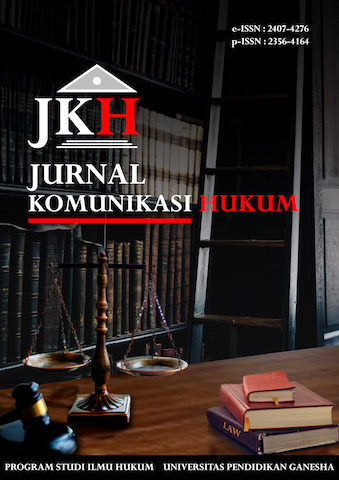ANALISIS PENERAPAN KEPEMIMPINAN TRANSFORMASIONAL DALAM MENINGKATKAN KUALITAS PELAYANAN PUBLIK DI LPKA KELAS I PALEMBANG
Abstract
The Child Special Guidance Institution or abbreviated as LPKA is a place for children to serve their criminal period. LPKA itself is a Technical Implementing Unit whose position is under and at the same time responsible to the Director General of Corrections. Transformational leadership is a process in which leaders and their subordinates strive to achieve higher levels of morality and motivation. According to Bass and Avolio (1994), transformational leadership styles that affect employee performance in order to create goals include dimensions/behaviors or better known as 4-I which is then applied to the Palembamg Class I LPKA. preparation of the organization's vision, mission, goals, and program activities. The inspirational motivation component possessed by superiors is not only using one leadership style but always looking at the situations and conditions they face. The intellectual stimulation component is the superior instilling work completion in a deft, timely manner, and the superior also avoids patronizing the employees but invites them to cooperate with each other. The individualized consideration component is the supervisor always follows up on employee needs, always holds workshops or training.
Downloads
Published
How to Cite
Issue
Section
License
Authors who publish with this journal agree to the following terms:- Authors retain copyright and grant the journal right of first publication with the work simultaneously licensed under a Creative Commons Attribution License that allows others to share the work with an acknowledgement of the work's authorship and initial publication in this journal.
- Authors are able to enter into separate, additional contractual arrangements for the non-exclusive distribution of the journal's published version of the work (e.g., post it to an institutional repository or publish it in a book), with an acknowledgement of its initial publication in this journal.
- Authors are permitted and encouraged to post their work online (e.g., in institutional repositories or on their website) prior to and during the submission process, as it can lead to productive exchanges, as well as earlier and greater citation of published work (See The Effect of Open Access).
Authors who publish with this journal agree to the following terms:
- Authors retain copyright and grant the journal right of first publication, with the work [SPECIFY PERIOD OF TIME] after publication simultaneously licensed under aCreative Commons Attribution License that allows others to share the work with an acknowledgement of the work's authorship and initial publication in this journal.
- Authors are able to enter into separate, additional contractual arrangements for the non-exclusive distribution of the journal's published version of the work (e.g., post it to an institutional repository or publish it in a book), with an acknowledgement of its initial publication in this journal.
- Authors are permitted and encouraged to post their work online (e.g., in institutional repositories or on their website) prior to and during the submission process, as it can lead to productive exchanges, as well as earlier and greater citation of published work (See The Effect of Open Access).












